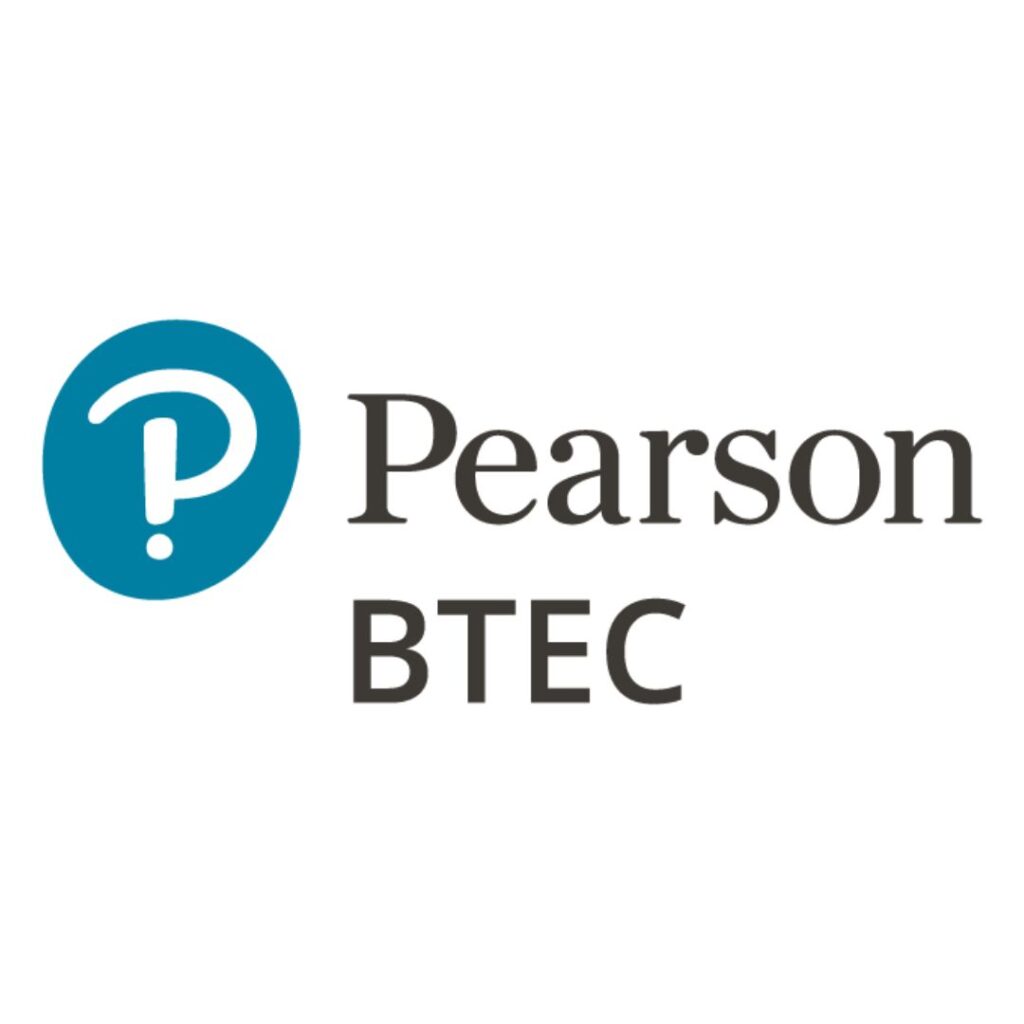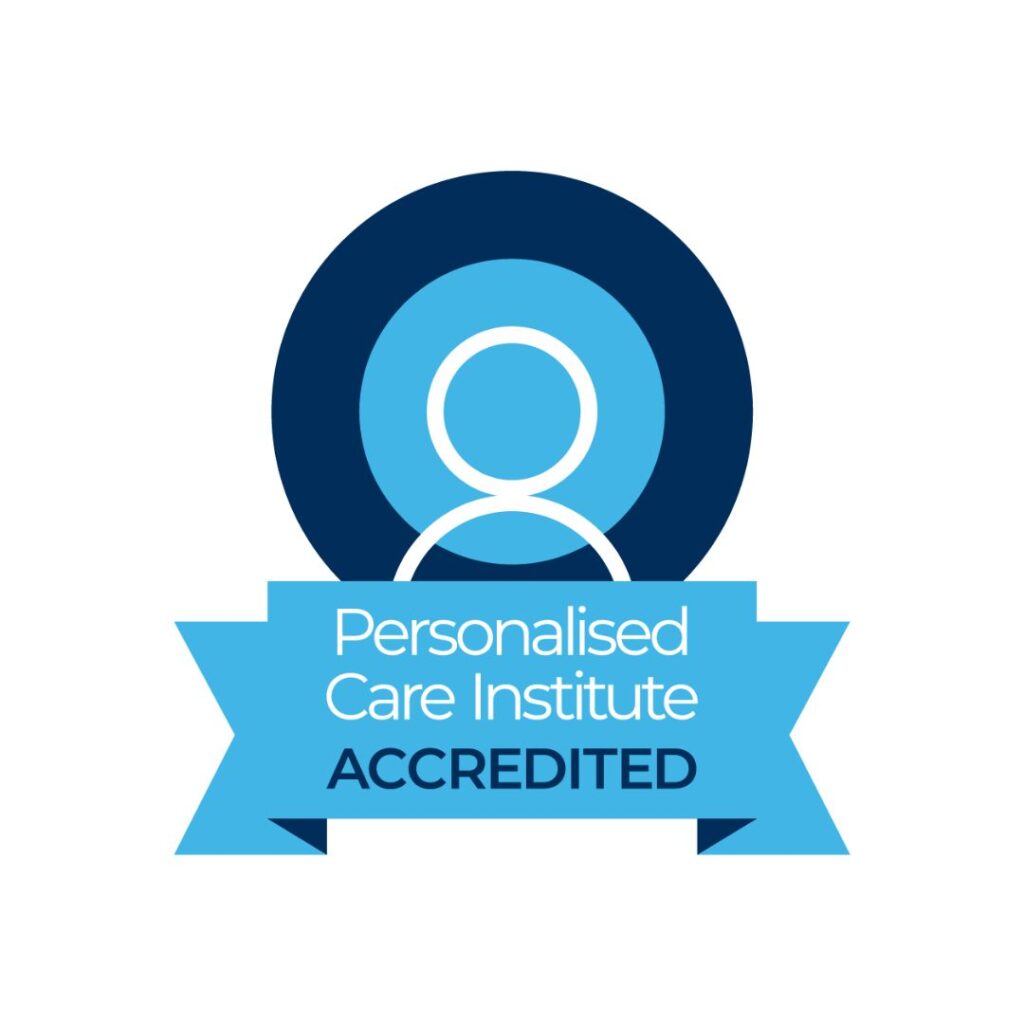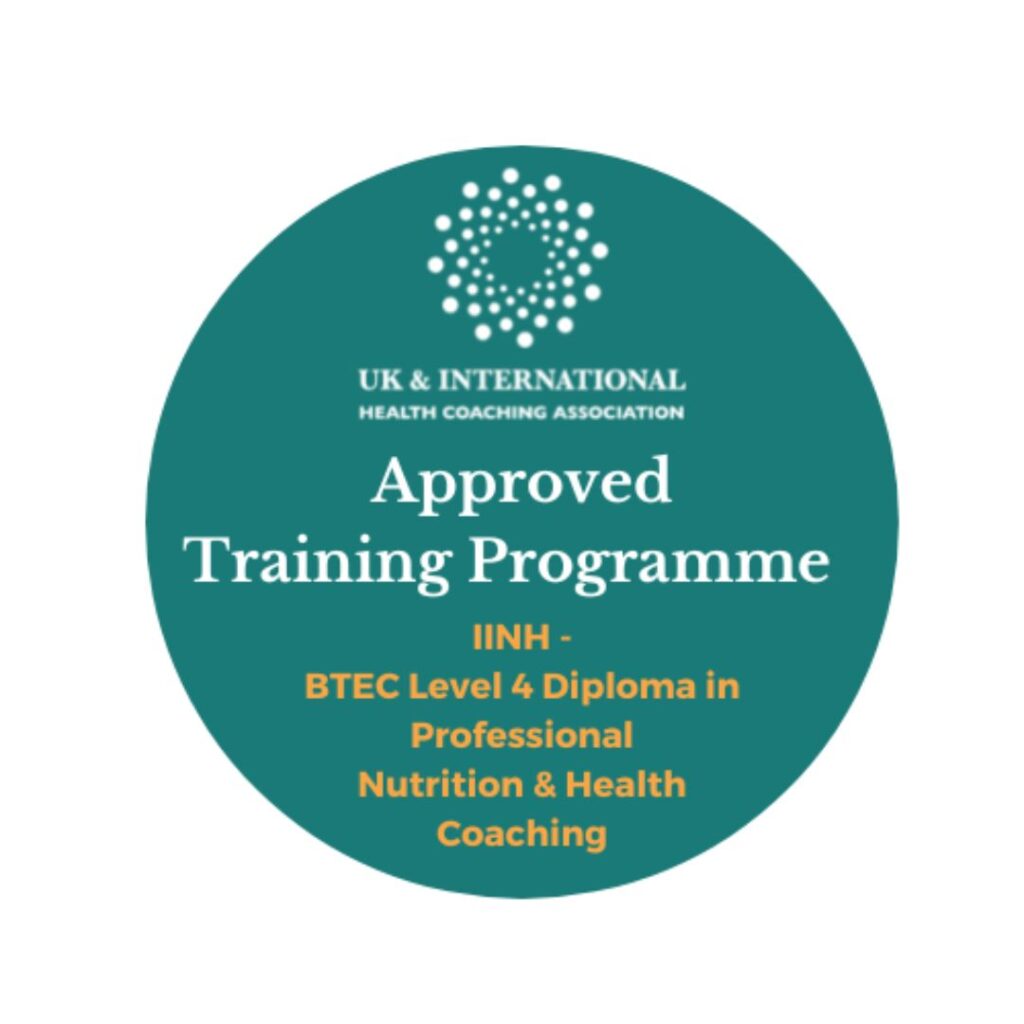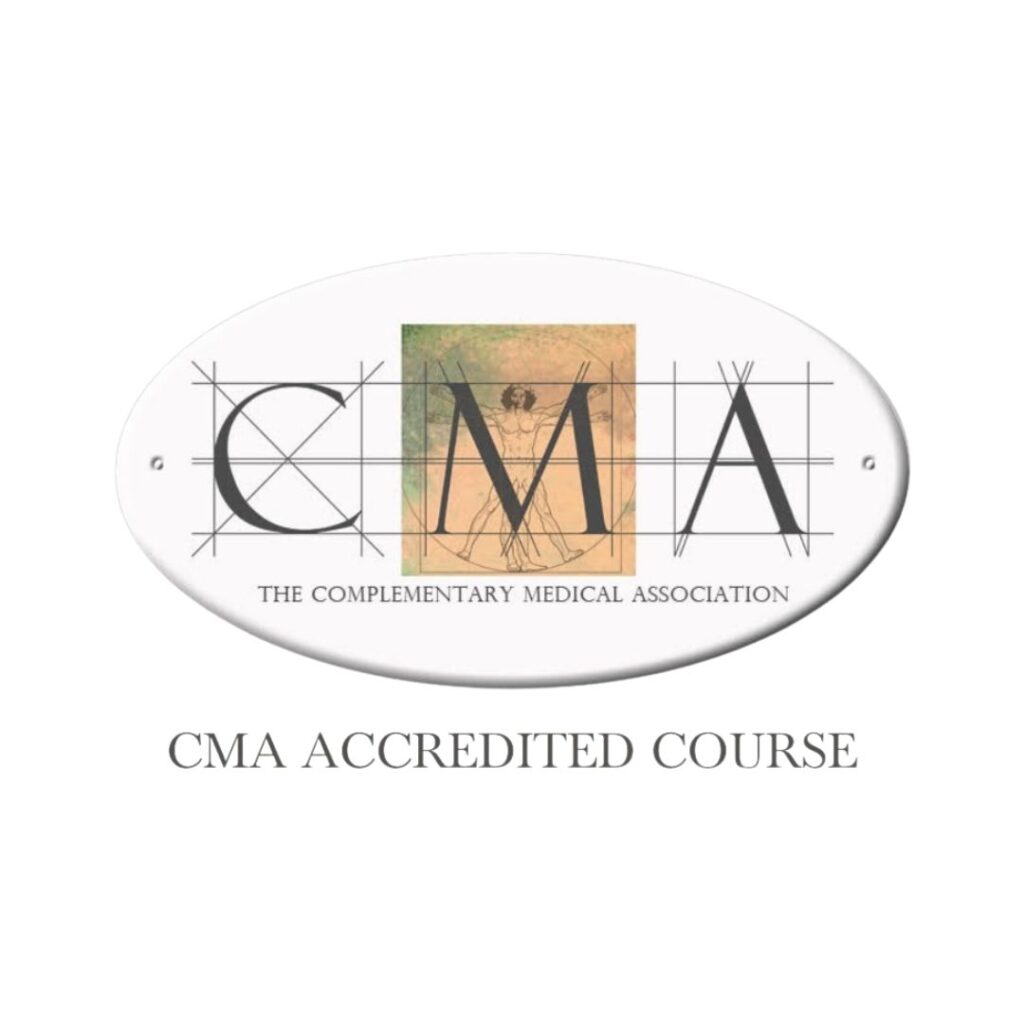Accelerated Diploma In Nutrition & Health Coaching
Accelerated course not running in 2025, however, our main BTEC Diploma in Professional Nutrition & Health Coaching, takes only 10 months to complete.
Become a Certified Nutrition & Health Coach
Explore how your passion for nutrition and well-being can blossom into a rewarding and fulfilling career as a Nutrition & Health Coach. Are you ready to take the first step on a journey that will not only transform your life but also enable you to transform the lives of others?
Our internationally recognised BTEC qualification is your passport to a thriving industry where knowledge, compassion, and expertise come together to make a profound impact on people’s lives.
In a world where individuals are becoming increasingly aware of the impact of poor diet and lifestyle on well-being, the path to lasting change often seems elusive. However, with our Nutrition & Health Coaching qualification, you will hold the key to empowering clients to achieve their health and wellness goals. By providing motivation, education, valuable resources, and unwavering support, you’ll guide them on a transformative journey, making lasting positive changes not only possible but achievable.
Join us in shaping a healthier future, one client at a time.
How is the accelerated course different?
Our Accelerated Diploma offers you the opportunity to complete our globally recognised BTEC Diploma in Professional Nutrition & Health Coaching in just 8 months.
How does it work? The course is divided into two sections – Self-Guided and Supported.
The Self-Guided Section has been developed for you to build your new knowledge base ahead of the more practical elements of the course. Topics are released for students to review and complete in their own time to allow for a more flexible learning style*.
The Supported section covers the more practical elements of developing as a Health Coach, e.g. Coaching Skills and Case Studies. In this section there will be weekly & monthly live learning sessions to support you in developing the skills needed to be a successful Health Coach.
At IINH support is our maxim, so you will still receive the care and support that IINH is renowned for to ensure that you qualify with skills and confidence needed to succeed as a Nutrition & Health Coach.
* You will be given early access to these topics when enrolling ahead of March 27th, should you wish to begin learning sooner. Click here to download a sample schedule for the course.
LEARN FROM THE BEST
Our internationally recognised Nutrition & Health Coaching programme is accredited by Pearson (BTEC), the world’s largest awarding body for education. Pearson approve and monitor the curriculum and assessment standards, and routinely audit students’ work. This way you can be assured that the content you are learning is up to date and of the highest standard.
The course is also accredited by the Personalised Care Institute and approved as a “Gold Standard” by the UKIHCA, the global professional body for Health Coaching. Students and Graduates are eligible to apply for Complimentary Medical Association Membership as they have demonstrated their commitment to excellence by choosing to train with IINH.

Enrolment Closed
Accelerated course not running in 2025, however, our main BTEC Diploma in Professional Nutrition & Health Coaching, takes only 10 months to complete.
Delivery
Online Course: This course is delivered fully online for all students.
Due to demand for an accelerated course, we have adapted our BTEC Diploma in Professional Nutrition & Health Coaching by splitting it into two sections – Self-Guided and Supported. This offers a more flexible learning style to students who wish to immerse themselves into their studies, while still offering the level of support that IINH is renowned for.
See full details of the structure of the course under “How is the Accelerated Course Different?” or click here to download a sample schedule for the course.
Basic computer skills essential.
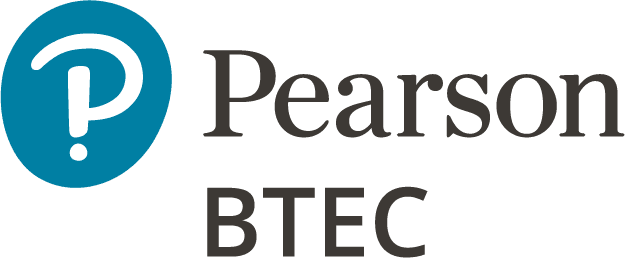
Accrediting Body
Pearson is the world’s largest education and awarding organisation. BTEC awards are highly respected vocational qualifications delivered in over 75 countries.
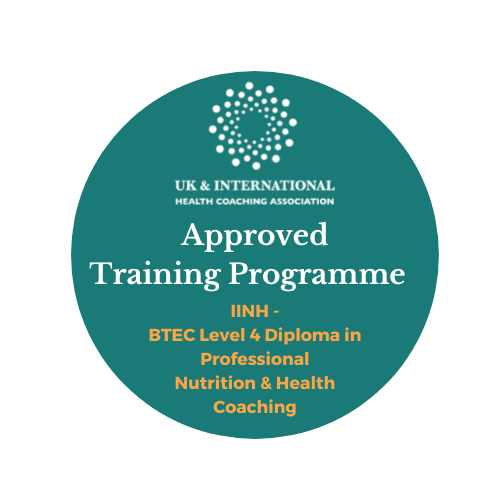
Professional Body
The UK & International Health Coaching Association promotes and supports accredited Health Coaches in their vital work of educating, motivating and guiding others towards improved health and quality of life.
Fees:
Accelerated course not running in 2025, however, our main BTEC Diploma in Professional Nutrition & Health Coaching, takes only 10 months to complete.
View course page for fees and early bird offers.
Need more information? Speak with our admissions team, with no obligation, by clicking the links below.
- Irish Admission Team
HEAR FROM IINH FOUNDER RICHARD BURTON
How the Course Works
Course content is accessible on our learning platform 24/7, to enable you to fit your learning around your busy schedule. Content for modules is released in the form of handouts, podcasts and videos, ahead of the live learning sessions, so that you can review all of the content in your own time and come to the sessions with any questions you may have for our expert tutors.
This vocational qualification offers practical, hands-on learning, engaging case study work, and interactive experiences with real clients, so that you can feel confident as you set out as a newly qualified Nutrition & Health Coach.
How We Support You
At IINH, we prioritise a personalised approach to education, providing individualised attention and support to every student. During the course you will be supported with:
- Live learning sessions via Zoom*
- One-to-one support from tutors, mentors & course coordinator
- Personal mentor for your case studies
- Moderated online forum
- Dedicated weekly support sessions via Zoom
- Ongoing alumni support after graduation
* Live Learning Sessions are recorded for those unable to attend
Internationally Accredited
BTEC Diploma in Professional Nutrition and Health Coaching is a higher education award accredited by Pearson (BTEC), the world’s largest awarding body for education.
BTEC are vocational qualifications, this means that you will gain hands-on experience with real clients during your case studies, giving you practical experience before you have qualified. You are supported throughout this portion of your studies with a personal mentor.
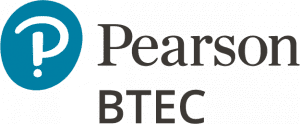
You may have found a Health Coaching course that looks interesting – but it really makes sense to check what you will actually get at the end of all your hard work! In this blog post we outline some of the important factors you should consider when choosing the right course for you.
Course Outline
The BTEC Diploma in Professional Nutrition & Health Coaching programme consists of ten assessed units, plus cooking.
10 course units, 600 estimated learning hours
- Health & Sickness – trends & challenges in chronic non-infectious diseases; promising developments & innovations in prevention & treatment
- Nutrition – Key developments, concepts, terms & tools in nutrition science, public health nutrition & agri-food industry; dietary guidelines, food pyramids & plates – origins & limitations
- Personalised nutrition – exploration of individualised vs traditional one-size-fits-all approaches. Concept of ‘literacy’ in health, food, nutrition
- Nutrients & Foods – nutrient profiles of food groups; deep dive into protein, fats, carbs, vitamins, minerals, antioxidants etc, incl. deficiency & excess issues; impacts of food refining & processing
- Online tools – food metrics, incl. nutrient composition & density; tracking dietary intakes
- Reliable Resources & Research – locating trustworthy information on nutrition & health topics; evaluating resources, publications, research
- Health & wellness coaching (HWC) – background, evolution, future prospects & potentials; HWC principles, processes, competencies; framework for developing coaching skills in client-led process
- Structured interview & protocol to establish coaching agreement; elicit client goals & relevant background info
- The Nutrition & Health Coaching process; initiate & develop the coaching relationship: build engagement to establish trust & rapport with active listening skills; establish realistic goals; use client-led process to design attainable action plans; facilitate client’s learning & progress by sharing knowledge, skills, attitudes, mindset; complete follow-up support sessions, with adjustments to plan as needed
- Case study reports – work with three volunteer clients: establish suitability, realistic goals; record detailed interview; develop, justify & agree plan with client, including behaviour change around food, lifestyle, sleep, relaxation, exercise; provide motivation, education, advice, tips, other support as needed; complete follow-up meetings, submit detailed case study reports for evaluation.
- Digestion – anatomy and physiology of digestive system & component organs; detailed digestion & absorption; hormonal regulation of appetite, hunger & satiety; common digestive problems & solutions
- Microbiome – importance, latest findings & implications; how to restore & nurture healthy microbiome & gut
- Digestive Issues – alleviating common digestive complaints by adjustments to diet & eating habits; how stress impacts digestion
- Intensive Farming – Origins, growth and practices used in industrial agriculture; impacts on soil, water, air, wildlife, worker & animal welfare, crop diversity, food quality, among others
- Food & Climate – Food miles & transportation, packaging, plastics, food waste; carbon emissions, pollution & diversity loss in rivers & oceans
- Regenerative Agriculture – Exploring worldwide initiatives promoting genuinely sustainable farming and food production
- Organic Farming & Food – Background, philosophy, practices, certification bodies, environmental & health benefits, affordability, comparison vs industrial practices
- GMOs – Background & developments in gene modification of crops & animals; environmental impacts, health implications, regulations, future trends
- Food Processing & Refining – Impacts on nutritional quality of staple foods & ingredients (wheat flour, sugar, seed oils); Ultra-processed foods & NOVA classification; ingredients & additives, fortification; shelf-life.
- Food labels – terms, regulations, health & nutrition claims
- Ingredients – disguised sugars, NOVA system, ultra-processed items
- Additives – categories, uses, potential hazards, ‘clean label’ trend
- Smarter choices – Compare similar products for healthier choices, using ingredients, nutrition data, health & nutrition claims, other messaging, etc
- Nutritional value for money – identify cheaper products that are healthy
- Epigenetics & nutrigenomics – threats to sperm & egg, fertility issues, environmental toxins, natural approaches for low fertility
- ‘Womb to tomb’ health – key challenges & dietary & lifestyle priorities at all ages & life stages: pre-conception, pregnancy, breast milk vs formula, weaning, infancy & childhood, adolescence, adulthood, menopause, senior years
- Managing stress – acute vs chronic stress; autonomic nervous system, sympathetic vs parasympathetic effects; chronic stress impacts on digestion, other systems, overall physical & mental health; escaping the ‘downward spiral’; mindset, tips and techniques for managing stress
- Sleep & relaxation – its healing & restorative power; techniques for better sleep hygiene; breath work & relaxation, herbs, music & tones, etc
- Metabolic illness – growth of non-infectious diseases associated with shifting consumption patterns of staple foods; future trends
- Insulin resistance (IR) – role of insulin in metabolism, managing glucose & fat stores, etc; hyperinsulinaemia, diabetes T2, other long-term impacts; potential to reverse IR with appropriate changes to diet, eating behaviours & exercise, etc;
- Ultra-processed foods – how they damage health in different ways
- Snacking – rise of frequent eating culture, negative impacts on weight & chronic health conditions
- Dietary upgrades – to improve or reverse IR-related conditions; low-carb & ketogenic approaches; healthy fats & nutrient dense diet
- Fasting & time-restricted eating – how it helps improve insulin sensitivity and promote metabolic flexibility
- Chronic inflammation – signs & symptoms, blood markers, lifestyle factors promoting inflammation; pro- & anti-inflammatory lifestyle factors & foods, including fish oils
- Detoxification – role in maintaining cellular health & overall; autophagy and its optimisation; supporting detoxification with nutritious foods & drinks, meal-spacing, exercise, etc
- Food Intolerances – mechanisms of allergy vs intolerance/sensitivity; rising incidences, background causes, incl. hygiene & ‘old friends’ hypotheses
- Unmasking culprits – intolerance testing; use of Elimination protocol to identify problem foods or ingredients
- Stress triggers – chronic stress can weaken digestion, promote ‘leaky gut’
- Autoimmune (AI) disease – how some AI conditions may be caused by an immune response to certain foods or ingredients
- Managing wheat & dairy – tips & swaps for avoiding these common problem foods
- Overweight & obesity – BMI, other measures, prevalences & trends worldwide
- Genetic influences – also epigenetic and social class effects, among others
- Origins of problem – shifts in consumption of staple foods and macros since 1970s; changes in physical activity; sedentary lifestyles; influence of time-poverty & convenience factors; rise of snacking, ultra-processed foods
- Weight control models – origins & dominance of calorie-in, calorie-out (CICO) model, uses & limitations, low-calorie diets, bariatric surgery; ‘set-point’ homeostatic theory of weight control; low-carb & ketogenic approaches & successes – recent research & future trends
- Personalised weight control – how use of individualised approaches to diet and lifestyle can effectively result in sustainable weight loss & maintenance .
- Exercise benefits physical health – improved energy, immunity, skeleton, muscle tone, balance, coordination, movement confidence, etc
- Exercise benefits mental health – improved sleep & mood, less depression, slower cognitive decline, relieves stress-related conditions, etc
- Supporting health span & longevity – combatting the hazards of sedentary living with suitable exercise habits
- Exercise aids weight loss – though diet is the master key to long-term success
- Types of exercise – benefits of: cardio & other aerobic training, strength work, high intensity (HIIT), balance & flexibility training; finding suitable exercise for client
- Over-exercising – health issues from excessive exercise, including fatigue, poor immunity & post-viral delayed recovery, mood swings, altered menstruation. Prioritise adequate recovery & rest, choose best healthy foods, drinks, snacks for training demands; don’t skip meals; possibly monitor heart rate, heart rate variability
- Sports performance – how body energy systems work; fuelling for different sports; optimising hydration for performance & health; foods & drinks suitable – or not – for performance & training days; potential benefits of safe & legal supplement use for athletes
- Planning to Coach – basic business plan using SMART goals or other model; hours per week, full- or part-time? – financial commitment needed to launch business
- Location – own home, rented space, client’s home, online only or hybrid
- Preferred clients – individuals or groups?; all-comers or certain issues only?;
- Requirements for practising – legal, professional & insurance requirements & any limitations in your country or state
- Professional membership – fees, benefits, opportunities & obligations of joining a professional coaching body; organisations for Health and Wellness Coaches in UK/Ireland, USA, Australia
- Marketing – branding, building website &/or blog & SM following; promotions, offers, freebies, testimonials, sponsors, collaborations, free talks, fees
- Connecting, improving – developing links & networks with health professionals, organisations, movements, communities; seek out regular continuous professional development in areas of interest
- Deliver presentations – how to plan & deliver an informal talk, presentation, class or course, online or in-person; building confidence: practise in front of friend, phone or computer; other tips & techniques for interesting, confident delivery & flow
- Preparing presentation – make plan to suit audience, venue & duration; allow time for Q&A; source & reference facts, other materials; prepare handout with own contact details; practise & time the presentation beforehand, get feedback, adjust as needed
- Presentation aids – PowerPoint or similar, handouts, slide printouts, questionnaires, flip charts, posters, samples, personal stories, demonstration; animations, video clips
- Structure & style – welcome, introduce self, background, topic overview, deliver main content, conclusion, Q&A
Wholesome food needs to be tasty and enjoyable if we want healthy eating habits to stick. Any useful nutrition course should teach practical knowledge and skills for preparing wholesome foods and meals. To serve this vital need we established our own dedicated cooking school and purpose-built ‘Taste Health’ demonstration kitchen.
Maggie Lynch, our Director of Cooking, will host two live online cooking classes via Zoom from the IINH Taste Health kitchen as part of our Nutrition & Health Coaching Diploma. Students attending these classes can get their cooking and food related questions answered by Maggie. Everyone will receive a comprehensive pack of delicious wholefood recipes, along with other practical information on healing foods, ingredients and better brands, etc.
We also host two attendance cooking classes during the course at an additional cost of €50 for those who wish to experience our Taste Health Kitchen in-person. Maggie and her team demonstrate a dozen or more delicious dishes from scratch, providing a wonderful buffet spread at the end. Students also receive a pack including recipes, tips on products, time-saving, storing and cooking, plus other practical materials for their own use and to offer future clients.
Self-Compassion Training for Healthcare Communities (SCHC) is a 6-week, evidence-based, adaptation of the Mindful Self-Compassion (MSC) programme. MSC is the empirically supported program of Dr. Kristin Neff (UT Austin) and Dr. Chris Germer (Harvard Medical School).
This abbreviated MSC training programme was specifically designed for healthcare professionals and is very relevant to all Caregivers. It is therefore something we are delighted to offer to our Nutrition and Health Coaches as part of their studies.
This training aims to improve wellbeing and personal resilience in professionals in the caring professions. It aims to do this by teaching mindful self-compassion skills to deal with distressing emotional situations as they occur at work and at home. Here at IINH we teach the programme in 6 x 90-minute weekly sessions as part of the Nutrition and Health Coaching course.
Burgeoning research is showing that self-compassion skills can be of particular benefit to people in caregiving professions, allowing them to experience greater satisfaction in their caregiving roles, less stress, and more emotional resilience.
In research published in the Journal of Clinical Psychology, Neff.Knox.2020, the SCHC program was found to significantly:
- Decrease: Depression, Stress, Secondary Traumatic stress, and Burnout
- Increase: Self-compassion, Mindfulness, Compassion for others, Job satisfaction in healthcare professionals
As opposed to other self-care techniques, self-compassion practices can be used on the spot at work with clients or colleagues or at home. These skills, although requiring an intentional daily effort to integrate, do not require extra time or formal meditation practice.
Participants of the programme will learn skills and tools to use throughout the day to:
- Care for themselves while caring for others
- Be able to listen with compassion
- Handle difficult emotions with greater ease
- Reconnect to the values that give life and work meaning
We have included this abbreviated version of the MSC programme in the Coaching programme to give our students the opportunity to learn some of these vital skills.
This programme will be facilitated by Julia Sweetman, Certified MSC teacher, Nutritional Therapist and Programme Director for our Nutritional Therapy course.
To find out more about Mindful Self Compassion please see https://centerformsc.org/
The assessment is based on a variety of mainly practical assignments and case studies. There is no written exam.
The IINH Scope of Practice is a document that outlines the framework in which the IINH Nutrition & Health Coach may work, once qualified.
Accreditations & Professional Bodies
What do our graduates say?



Sample class
Try us out for FREE! Sample some of our course content, learn more about our additional units and get a tour of our learning platform.
FIND OUT MORE ABOUT NUTRITION & HEALTH COACHING
View our blog series about Health Coaching and things to consider when selecting the right course for you.
See what some of our graduates have gone on to do with their qualifications.







Sign up for our newsletter
| Thank you for Signing Up |


